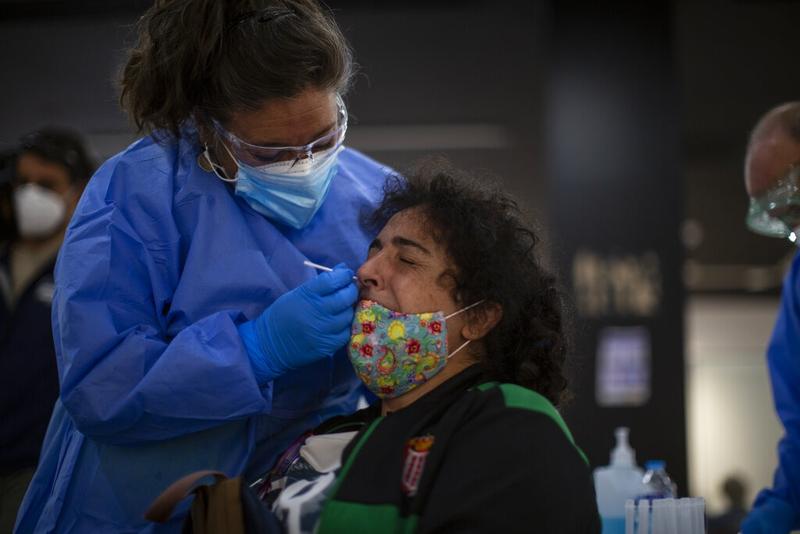 A health worker takes a swab sample from a woman for a rapid antigen test for COVID-19, in the southern neighbourhood of Vallecas in Madrid, Spain, Oct 7, 2020. (MANU FERNANDEZ / AP)
A health worker takes a swab sample from a woman for a rapid antigen test for COVID-19, in the southern neighbourhood of Vallecas in Madrid, Spain, Oct 7, 2020. (MANU FERNANDEZ / AP)
WASHINGTON / OTTAWA / MEXICO CITY / PARIS / PRAGUE / BRASILIA / TUNIS / DUBLIN / MILAN / LONDON / BERLIN / BUENOS AIRES / TRIPOLI / SANTIAGO / VILNIUS / ALGIERS / BOGOTA / BRUSSELS / KIEV / SOFIA / CAIRO / VIENNA / MOSCOW / WARSAW / ZAGREB / MADRID / ZURICH - A COVID-19 vaccine is looking “unlikely” by year-end, according to the head of Europe’s drug regulator, even as the agency conducts sped-up reviews of two front-runners for a successful shot.
“Technically, of course it’s possible. Practically it’s very difficult -- it’s very unlikely,” Guido Rasi, executive director of the European Medicines Agency, said Thursday in an interview. Even if drugmakers “submit the data in a few weeks, we are already approaching middle of October, so if we wait a few weeks and we take a minimum time of evaluation, more or less we are at the end of the year.”
The European Commission said on Thursday it had sealed a supply deal with Johnson & Johnson for the supply of its potential COVID-19 vaccine for up to 400 million people, marking the third advance purchase contract signed by the EU with makers of COVID-19 vaccines after deals with AstraZeneca and Sanofi.
Also on Thursday, the bloc donated 900,000 COVID-19 test kits to the African Union (AU) in a major boost to the African continent's anti-COVID-19 efforts. The 900,000 COVID-19 test kits are the third and last batch of the 1.4 million COVID-19 test kits donated by Germany.
Earlier on Thursday, the Commission said it had signed a second contract with US drugmaker Gilead for the supply of up to 500,000 treatment courses for remdesivir, sharply increasing the supply of the COVID-19 treatment in Europe.
The deal will cover purchases of the drug for the next six months for the 27-nation EU, Britain, six Balkan countries and the other European Economic Area countries - Iceland, Liechtenstein and Norway. Gilead said it would begin fulfilling orders from next Monday.
The deal comes as several European countries have said they are experiencing shortages of the drug.
Global tally
Global coronavirus infections surpassed 36 million Thursday while the global death toll topped 1.05 million, according to the Center for Systems Science and Engineering (CSSE) at Johns Hopkins University.
Africa tally
The total number of confirmed COVID-19 cases recorded across the African continent reached 1,526,000 while the death toll hit 37,098 as of Wednesday, the Africa Centers for Disease Control and Prevention (Africa CDC) said.
Algeria
Algeria reported on Wednesday 121 new COVID-19 cases, the lowest daily increase since June 20, bringing the tally to 52,520, the Ministry of Health said.
The ministry also reported six additional fatalities, raising the death toll to 1,779.
 A health worker attends to a patient in an intensive care unit designated for people infected with COVID-19 at a hospital in Buenos Aires, Argentina, Oct 2, 2020. (NATACHA PISARENKO / AP)
A health worker attends to a patient in an intensive care unit designated for people infected with COVID-19 at a hospital in Buenos Aires, Argentina, Oct 2, 2020. (NATACHA PISARENKO / AP)
Argentina
Argentina should boost testing and contact tracing to curb the spread of the coronavirus, the Pan American Health Organization (PAHO) suggested on Wednesday.
PAHO is the World Health Organization's regional office for the Americas.
"Argentina took good measures. It was one of the first countries to implement measures, to implement quarantines, and it took measures for the benefit of the population," said Marcos Espinal, director of the PAHO's Department of Communicable Diseases and Health Analysis, during a videoconference.
While acknowledging the country's swift action, he pointed out that contact tracing system has been "the most difficult thing for Argentina," mainly in Greater Buenos Aires.
As of Wednesday, Argentina has reported 840,915 cases with 22,226 deaths from COVID-19.
Austria
Austria recorded 1,209 new coronavirus cases in the past 24 hours, clearly surpassing the previous record set in March during the first wave of infections, data sent by the Interior Ministry showed on Thursday.
Daily cases have been rising since late June and had recently come close to the March 26 record of 1,050, according to an online dashboard by Austria's main public health body, the Agency for Health and Food Safety (AGES).
Of the new cases reported on Thursday, more than half, 613, were in Vienna.
 A woman wearing a face mask waits for the bus at a bus station in Sao Paulo, Brazil, Sept 24, 2020. (RAHEL PATRASSO / XINHUA)
A woman wearing a face mask waits for the bus at a bus station in Sao Paulo, Brazil, Sept 24, 2020. (RAHEL PATRASSO / XINHUA)
Brazil
Brazil passed the mark of 5 million confirmed COVID-19 cases on Wednesday as it approached 150,000 deaths in the second most deathly coronavirus outbreak outside the United States.
Though the number of daily cases has come down from a peak in July, public health experts warn that Brazil is ignoring social distancing precautions and faces the danger of a second wave by returning to normal everyday life too quickly.
The Health Ministry reported on Wednesday 31,553 new cases, raising the tally to 5,000,694, and 734 deaths, bringing the toll to 148,228.
The rolling daily average for last week was 658 deaths a day, down from 1,073 deaths per day in the last week of July. Average new cases were 26,140 day, almost half the rate of late July.
Federal University of Rio de Janeiro epidemiologist Roberto Medronho cautioned that the numbers could be much higher if testing for COVID-19 was more widespread.
ALSO READ: Leader’s infection highlights Brazil toll
Bulgaria
Bulgaria's Health Ministry reported on Thursday morning a record high of 437 newly confirmed COVID-19 cases over the past 24 hours, taking the tally to 22,743.
The previous daily record of 436 new cases was reported on Wednesday.
The death toll rose by 11 to 873, the ministry said.
Canada
Canada's daily COVID-19 tally continued to rise steeply with an average of 2,052 new cases being reported daily in the past seven days, said Canada's Chief Public Health Officer Theresa Tam on Wednesday.
That represents an increase of 40 percent from the previous week.
Canada is also seeing an upward trend in the number of COVID-19 patients being hospitalized. Over the past week, there was an average of 644 COVID-19 cases in hospital per day and 18 deaths reported daily, Tam said in a statement.
As of Wednesday afternoon, Canada had reported 173,008 confirmed cases, including 9,541 deaths, according to CTV.
Chile
The Chilean government reported on Wednesday that the number of confirmed COVID-19 cases rose to 474,440 after 1,131 new cases were reported in the last 24 hours, while the death toll rose to 13,090 after 20 more deaths were registered in the same period.
Minister of Health Enrique Paris said at a press conference that 14 regions have seen a drop in the number of daily cases in the last seven days, but added that the southern region of Magallanes continued to report a high infection rate.
Meanwhile, the Office of the Presidency reported that three active cases have been discovered at the presidential residence of La Moneda.
The office said in a statement that President Sebastian Pinera did not have close contact with any infected people.
Colombia
The tally of COVID-19 infections in Colombia has risen to 877,683 after tests detected 7,875 new cases in the past 24 hours, the Health Ministry said Wednesday.
The death toll climbed to 27,180 after 163 additional fatalities were reported, said the ministry. A total of 773,973 patients have so far recovered, it added.
Health Minister Fernando Ruiz said that the vaccine that Colombia may acquire through the COVAX, a global initiative aimed at ensuring COVID-19 vaccine availability, will be offered to people who have had the disease.
Croatia
Croatia's daily COVID-19 infections hit a record high 542 on Thursday, health authorities said.
The previous record high of 369 was reported on Sept. 3.
Since the outbreak of the pandemic, Croatia has reported 18,989 cases with 310 fatalities. There are 2,206 active cases currently.
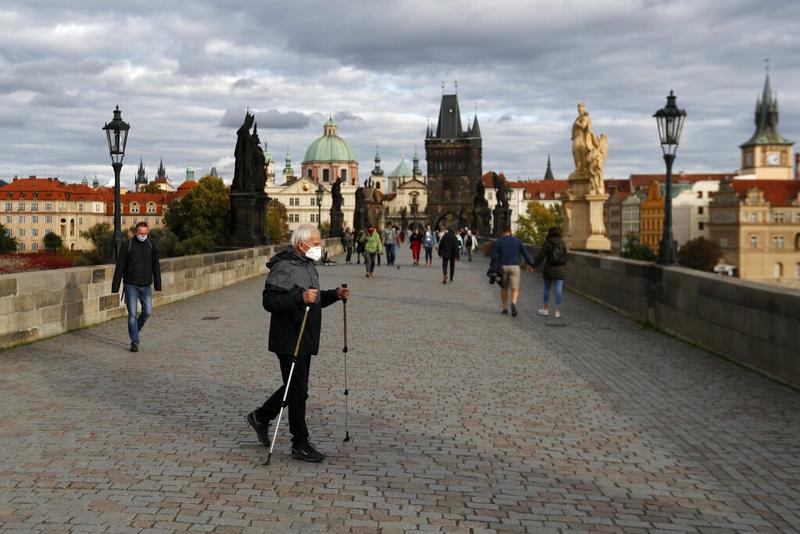 People wearing face masks walk on the medieval Charles Bridge in Prague, Czech Republic, Oct 7, 2020. (PETR DAVID JOSEK / AP)
People wearing face masks walk on the medieval Charles Bridge in Prague, Czech Republic, Oct 7, 2020. (PETR DAVID JOSEK / AP)
Czech Republic
The Czech Republic’s 14-day cumulative number of cases per capita is now the highest in the EU, surpassing Spain.
The Czech Republic reported 5,335 new coronavirus cases on Wednesday, its highest one-day tally since the pandemic started, Health Ministry data showed on Thursday.
The rise surpassed a previous record of 4,457 reported the previous day as the country of 10.7 million had Europe's fastest per-capita spike in cases in the past two weeks.
In total, the country has recorded 95,360 cases since March, along with 829 deaths.
Egypt
Egypt recorded late on Wednesday 133 new COVID-19 cases, raising the tally to 104,035.
Health Ministry spokesman Khaled Megahed said in a statement that nine more deaths were registered in the past 24 hours, taking the death toll to 6,010.
Finland
Finland’s rate of new infections has more than doubled in the past two weeks, with 1,719 new cases reported in the two-week period through Oct 4, up from 817 during the previous fortnight.
About 60 percent of the new cases can’t be traced, authorities said on Thursday. To date, 11,049 people in Finland have contracted the virus, along with 346 deaths.
Finland likely had up to five times more COVID-19 cases than its official numbers showed during the first wave of the pandemic between March and May, its public health authority THL said on Thursday, citing results from its antibody tests.
The official COVID-19 case numbers are based on diagnostic tests taken from the nose or throat of a person with symptoms while antibody tests are performed on a blood sample to find out whether a person has previously been infected.
The difference in the numbers is largely explained by the lack of testing capacity during the first wave of infections, THL's head of health security Mika Salminen said.
France
President Emmanuel Macron’s government ordered bars in Paris to close for a two-week period and said more curbs will be announced on Thursday. The Czech Republic is considering additional steps to prevent the disease from spreading.
France’s health minister will announce measures on Thursday that will focus on places where the virus is circulating faster among elderly people and where hospitals are the fullest, Macron said.
The number of COVID-19 patients in intensive care in Paris hospitals has tripled since the start of September, similar to the situation in the Marseille region.
The French government will put Lyon and Lille on maximum COVID-19 alert, France Inter radio reported on Thursday, paving the way for new restrictions to curb the spread of the novel coronavirus in the two cities.
Health Minister Olivier Veran will announce the decision at a news conference later Thursday, it said on its website.
France reported on Wednesday a second daily record of new COVID-19 infections in five days, while hospitalizations for the disease stood at a three-month high.
Health authorities said there were 18,746 new cases, versus a previous record on Oct 3 of 16,972. The seven-day rolling average of new infections, which smooths out daily variations, rose to 12,853, its highest level yet.
The tally now stands at 653,509, the world's 10th highest. The death toll stood at 32,445, up by 80.
"In places where the disease is circulating too quickly ... there will be new restrictions," French President Emmanuel Macron said during an interview aired on France's two main television channels.
READ MORE: Paris bars close as coronavirus spreads
French health authorities said more than 7,500 patients were currently being treated in hospital for COVID-19, marking a three-month high.
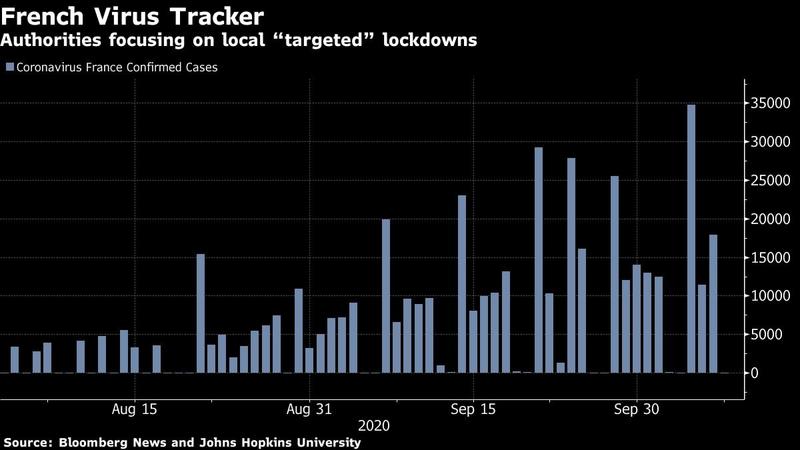
Germany
Berlin is fighting against a surge in infections. The German capital has the worst outbreak among the country’s 16 states, with 40.5 cases per 100,000 people over the last seven days, according to the country’s public health authority.
German Health Minster Jens Spahn said Thursday the rise in coronavirus infections was worrying and the worsening situation in Europe posed a risk for Germany.
The daily tally of new cases in Germany leapt by almost half, official data showed on Thursday
While ruling out the idea of a second national lockdown, Spahn called for targeted local restrictions and appealed to individuals to avoid situations where the virus is likely to spread, such as indoor gatherings and poorly ventilated areas.
The daily tally of new cases leapt by almost half, official data showed. The number of infections increased by 4,058 to 310,144 while deaths rose by 16 to 9,578, data from the Robert Koch Institute (RKI) for infectious diseases showed on Thursday.
According to a separate tally by Johns Hopkins University, virus cases climbed by 4,010, the highest since April 10, to 311,137. The death toll rose by 21 to 9,571.
Lothar Wieler, the head of RKI, warned that Germany could see 10,000 new coronavirus cases per day unless people stick to hygiene and distancing rules.
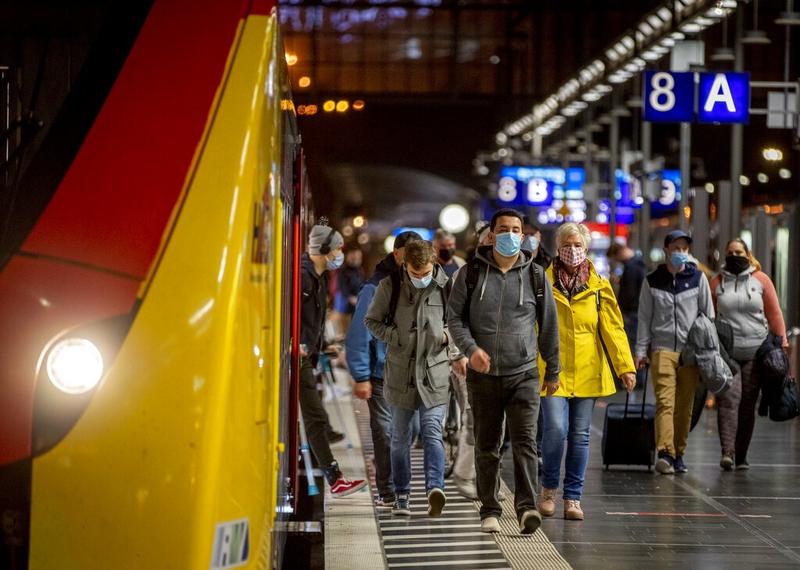 Passengers wearing face masks walk on a train platform at the central train station in Frankfurt, Germany, Oct 8, 2020. (MICHAEL PROBST / AP)
Passengers wearing face masks walk on a train platform at the central train station in Frankfurt, Germany, Oct 8, 2020. (MICHAEL PROBST / AP)
The Weidemark meatpacking plant in Soegel in north Germany, owned by the giant Toennies group, has been ordered to close initially for 22 days, authorities said. Some 112 of its 2,000 or so workers have tested positive for the new coronavirus.
Germany's states agreed on Wednesday that residents of domestic coronavirus risk areas should not be allowed to stay in hotels in other parts of the country to curb surging numbers of new infections, a government document showed.
On the same day, Germany declared the whole of Georgia, Jordan, Romania and Tunisia to be coronavirus risk regions, meaning returnees from there will have to enter quarantine pending a negative coronavirus test. Regions of other countries also added to the quarantine list include the Netherlands, Bulgaria, Croatia, Lithuania, Slovakia, Slovenia and Hungary. The French island of Corsica was removed from the list.
Georgia
Georgia reported 472 new COVID-19 cases on Thursday, bringing its tally to 10,225.
Of the 472 new cases, 230 were confirmed in the western Adjara region, the National Center for Disease Control and Public Health said.
As of Thursday, 5,553 patients have recovered while 66 others have died, the center said.
Ireland
The spread of COVID-19 in Ireland has reached an exponential growth phase and a coming surge in hospitalizations will create a "very significant challenge" for Irish society, a leading public health official said on Wednesday.
Despite an accelerating second wave of coronavirus infections, the government rejected a recommendation from public health officials on the National Public Health Emergency Team (NPHET) to impose a much stricter lockdown.
In a statement on Wednesday, the Public Health Emergency Team officials said that the situation had worsened further since their weekend recommendation.
"We are looking at a rapidly deteriorating position, we're looking at a position that is very precarious because we are in a phase of exponential growth," Philip Nolan, head of NPHET's COVID-19 modeling group, said at a press briefing.
A total of 39,584 COVID-19 infections and 1,816 deaths had been reported in Ireland.
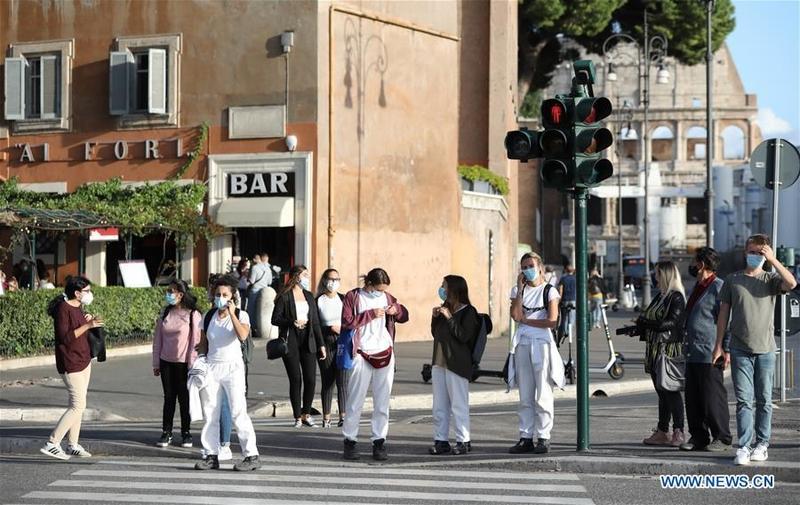 People wearing face masks wait to cross a road at a traffic junction in Rome, Italy, Oct 6, 2020. (CHENG TINGTING / XINHUA)
People wearing face masks wait to cross a road at a traffic junction in Rome, Italy, Oct 6, 2020. (CHENG TINGTING / XINHUA)
Italy
Italy will make testing for COVID-19 compulsory for people traveling from the United Kingdom, Netherlands, Belgium and the Czech Republic, Health Minister Roberto Speranza said on Wednesday, following growing concerns about rising cases across Europe.
"Infection data are growing across all of Europe and in Italy too", Speranza wrote on Facebook.
Data from the Italian Health Ministry showed 3,678 cases were reported in the last 24 hours, up from 2,677 on Tuesday and surging past the 3,000 mark for the first time since April 24.
Some 31 people died of the virus on Wednesday, the ministry said.
The country's cumulative number of COVID-19 cases stood at 333,940, including 235,303 recoveries and 36,061 deaths.
ALSO READ: Netherlands wakes up to virus surge after months of confidence
Libya
The National Center for Disease Control of Libya reported on Wednesday 1,045 new COVID-19 infections, bringing the tally to 39,513.
The center said in a statement that six more patients died, taking the country's death toll to 608, while the number of recoveries totaled 22,831, up by 241.
Lithuania
Lithuania decided on Wednesday to change the requirement for countries on its COVID-19 "affected" list, according to a release from the government.
According to the decision, the self-isolation requirement will be applied only to people coming from countries where the COVID-19 incidence is at least 10 percent higher than in Lithuania in the last 14 calendar days.
Currently, the requirement for the self-quarantine applies to countries where there are 25 cases per 100,000 inhabitants in the last 14 calendar days. Lithuania's morbidity rate now stands at 53.9 cases per 100,000 inhabitants.
The updated list will come into effect on Monday.
According to the Ministry of Health, Lithuania has reported a total of 5,483 confirmed cases by Wednesday, along with 101 deaths and 2,600 recoveries.
Mexico
Mexico's health ministry reported on Wednesday 4,580 newly confirmed cases of coronavirus infection and 378 additional fatalities, bringing the total in the country to 799,188 cases and 82,726 deaths.
Morocco
Morocco reported on Wednesday 2,776 new COVID-19 cases, the biggest single-day increase so far, taking the number of infections to 140,024.
The death toll rose by 29 to 2,439, according to the Ministry of Health.
Netherlands
The number of confirmed coronavirus infections in the Netherlands jumped by a record of more than 5,800 in 24 hours, data released by health authorities on Thursday showed.
The rapid rise is putting pressure on authorities to impose new restrictions in the country, which has one of the highest per capita infection rates in the world
Poland
Wearing masks outside will be compulsory across the whole of Poland from Oct 10 and restrictions for schools may have to be tightened, the prime minister said on Thursday, after the country saw another record daily spike in new coronavirus cases.
Poland's daily coronavirus cases surged more than 40 percent on Thursday compared to the previous day, as infection rates hit a new record just as the capital Warsaw was set to be added to a list of areas with additional restrictions.
Poland reported a new record of 4,280 daily coronavirus cases on Thursday, according to the health ministry's Twitter account, up 42.5 percent compared to the 3,003 reported on Wednesday. It also reported 76 coronavirus-related deaths, a new record.
Earlier on Thursday, Deputy Health Minister Waldemar Kraska confirmed to public radio that the Polish capital Warsaw would be added to a list of areas with additional restrictions due to high numbers of coronavirus cases.
In total, the country of 38 million has reported 111,599 cases of the coronavirus and 2,867 deaths.
Portugal
Portugal recorded on Thursday more than 1,000 new coronavirus cases in a single day for the first time since April, with the government warning the country must gear up for the battle ahead.
“We have to prepare for what is coming,” State Secretary of Health Antonio Lacerda Sales told reporters during a visit to a hospital in Braga, a city in the country’s northern region.
According to health authority DGS, a total of 1,278 new infections and 10 deaths were reported on Thursday. The last time Portugal posted over 1,000 daily infections was on April 10 during the country’s six-week lockdown.
Russia
The Kremlin said on Thursday that a rise in new coronavirus cases in Russia was a cause for serious concern and warned that numbers could rise even quicker unless people took heed of the situation and protected themselves.
Russia reported 11,493 new coronavirus cases earlier on Thursday, just short of the most confirmed in a single day during the pandemic, pushing the overall total to 1,260,112.
Officials said 191 people had died in the last 24 hours, pushing the official death toll to 22,056.
Russia confirmed its biggest one-day tally on May 11 with 11,656 cases.
Slovakia
Slovakia's daily tally of new coronavirus cases rose to 1,037, the highest since the pandemic reached the country, Prime Minister Igor Matovic said on Thursday.
"Let's all be extra-cautious, please," Matovic said in a post on his Facebook profile.
Spain
Spain is now bringing military discipline to contact tracing, which experts say is key in stemming the spread of the pandemic.
At five army bases in Madrid, 150 volunteer soldiers spend their days calling people who have been diagnosed with COVID-19, mapping recent social interactions, and asking those potentially infected to stay at home.
A Madrid court on Thursday struck down an order that imposed a partial lockdown in the capital city and nine satellite towns, siding with the Madrid region in a standoff with the central government.
Following an order from the Health Ministry, the Madrid region was forced to bar residents from leaving without a valid reason from last Friday. The regional authority had appealed the order.
Spain reported a record 5,075 in the past 24 hours, according to Health Ministry data published Wednesday.
Including adjustments for older cases, the total number of infections rose by 10,491 to a total of 835,901 since the start of the pandemic.
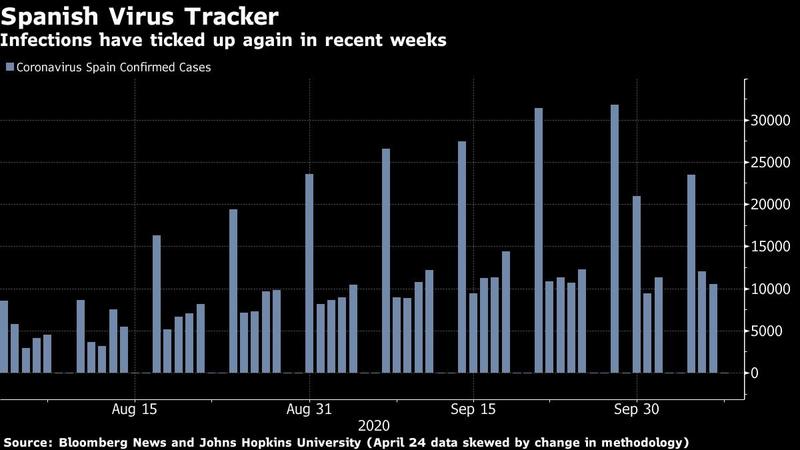
Switzerland
The number of new coronavirus infections rose by 1,172 in a day, data from Switzerland's public health agency showed on Thursday.
The agency reported a total of 58,881 confirmed cases. The death toll rose by two from Wednesday to 1,791.
The country reported its first confirmed case in late February. New daily cases peaked at 1,456 on March 23 and had dwindled to as few as three on June 1.
Tunisia
A 15-day curfew will be imposed in the Grand Tunis area from Thursday, the governor of Ariana province Samir Abdeljawed announced on Wednesday night.
Abdeljawed said the move aims to limit the spread of COVID-19 pandemic in the Grand Tunis area, which includes the provinces of Tunis, Ariana, Ben Arous and Manouba.
The governors of the four provinces said in a statement broadcast on state TV that there would be a curfew between 9 pm and 5 am and a suspension of Friday prayers in mosques. State TV said the curfew would start at 7 pm on weekends.
The Health Ministry reported on Wednesday 2,312 new cases, raising the tally to 24,542, along with 364 deaths.
Elyes Fakhfakh, who stepped down as prime minister last mont, has announced he has tested positive, as has the leader of a major party, Abir Moussi.
UK
British Prime Minister Boris Johnson's government is considering additional local COVID-19 restrictions for parts of northern England as the second wave of the novel coronavirus accelerates, Housing Secretary Robert Jenrick said on Thursday.
Johnson will order pubs and restaurants to shut across much of northern England, including in Manchester and Liverpool, from Monday in a bid to halt the spiralling COVID-19 outbreaks there, The Sun reported on Wednesday. Hospitality would shut but schools, offices and shops would remain open, it added.
Johnson's reported plans follow Scotland's announcement that all pubs in Glasgow and Edinburgh must close for 16 days from Friday under the latest wave of COVID-19 restrictions.
The United Kingdom recorded 14,162 new daily cases of COVID-19 on Wednesday, slightly down on the 14,542 it reported the day before, government data showed. The tally now stands at 544,275.
A further 70 people died after testing positive for the virus within 28 days, pushing the death toll to 42,515.
Britain's finance ministry is also finalizing a new package of coronavirus support for the stricken hospitality industry, the Financial Times said late on Wednesday.
Ukraine
Ukraine's medical system could break down because of a surge in new coronavirus cases and the number of hospitalized people, the country's health minister warned on Thursday.
Ukraine registered a record 5,397 COVID-19 cases in the past 24 hours, up from the previous record of 4,753 new cases reported on Wednesday. The number of deaths grew by 93 and reached 4,690, Maksym Stepanov said at a televised briefing.
Stepanov said a total of 244,734 cases had been registered as of Oct 8, along with 4,690 deaths and more than 20,000 people hospitalized.
US
The Marine Corps said on Wednesday its No. 2 officer, General Gary Thomas, had tested positive for COVID-19, becoming the second senior military official to do so this week, another sign of the danger to top brass who met both men at the Pentagon.
Thomas, the Marine Corps’ assistant commandant, is suffering mild symptoms and is self-quarantining at home, the Marine Corps said.
The Marine Corps said its No. 2 officer, General Gary Thomas, had tested positive for COVID-19, becoming the second senior military official to do so this week
Nearly all the Joint Chiefs of Staff, including its chairman, Army General Mark Milley, are in quarantine after attending top-level meetings last week with Thomas and the Coast Guard’s No. 2 official, Admiral Charles Ray, who tested positive on Monday for the disease caused by the coronavirus.
The list of top generals quarantining include General Paul Nakasone, head of the National Security Agency and US Cyber Command, as well as the chiefs of the Army, Navy, Air Force and Space Force.
Meanwhile, a top White House security official, Crede Bailey, is gravely ill with COVID-19 and has been hospitalized since September, according to four people familiar with his condition.
READ MORE: Trump says catching COVID-19 was 'blessing from God'
Nationwide, coronavirus case in the US surpassed 7.54 million as deaths topped 211,000, according to a tally by Johns Hopkins University.
Malls in Los Angeles were open on Wednesday for the first time in months, but movie theaters and Disneyland remained shuttered.
Wisconsin is activating a Milwaukee-area alternative care facility as the state’s hospitals are increasingly overwhelmed by surging infections.
In New York, the COVID-19 infection rate in the state's hot spots is five times what the rate is statewide, Governor Andrew Cuomo said.
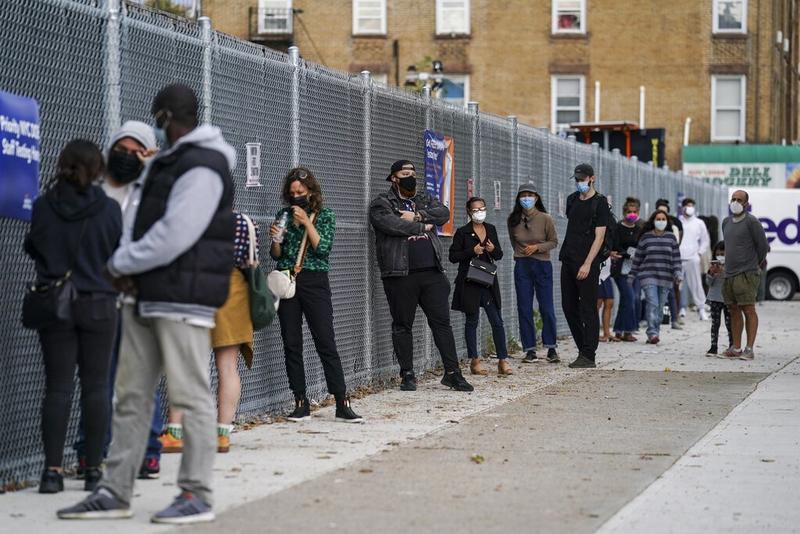 People wait in line outside a COVID-19 testing site that provides priority testing for NYC Department of Education staff, in the Borough Park neighborhood of the Brooklyn borough of New York, on Oct 7, 2020. (JOHN MINCHILLO / AP)
People wait in line outside a COVID-19 testing site that provides priority testing for NYC Department of Education staff, in the Borough Park neighborhood of the Brooklyn borough of New York, on Oct 7, 2020. (JOHN MINCHILLO / AP)
Eil Lilly
Eli Lilly and Co said on Wednesday it applied for US emergency use authorization (EUA) for its experimental COVID-19 antibody treatment and plans to pursue a similar approval for a dual antibody therapy next month after it produced promising data.
The drugmaker said its two-antibody cocktail helped reduce viral levels more than the single antibody treatment had in a prior study. The lower viral load was potentially tied to a reduction in COVID-19 symptoms, the company said.
Data in September showed that Lilly's single antibody therapy, LY-CoV555, which is being developed with Canadian biotech AbCellera, helped cut hospitalization and emergency room visits for COVID-19 patients.
Based on that data, Lilly applied for an EUA with the US Food and Drug Administration and said it expects about one million doses of the biotech drug to be available by the end of the year.
Regeneron
Regeneron Pharmaceuticals Inc also said it has asked federal regulars to authorize its antibody treatment for COVID-19 for emergency use.
US President Donald Trump received the antibody cocktail last Friday under a compassionate use program after becoming sick with the coronavirus.
Trump hailed Regeneron’s treatment in a video posted on Twitter Wednesday, saying he would authorize its emergency use and make it available to Americans for free.


